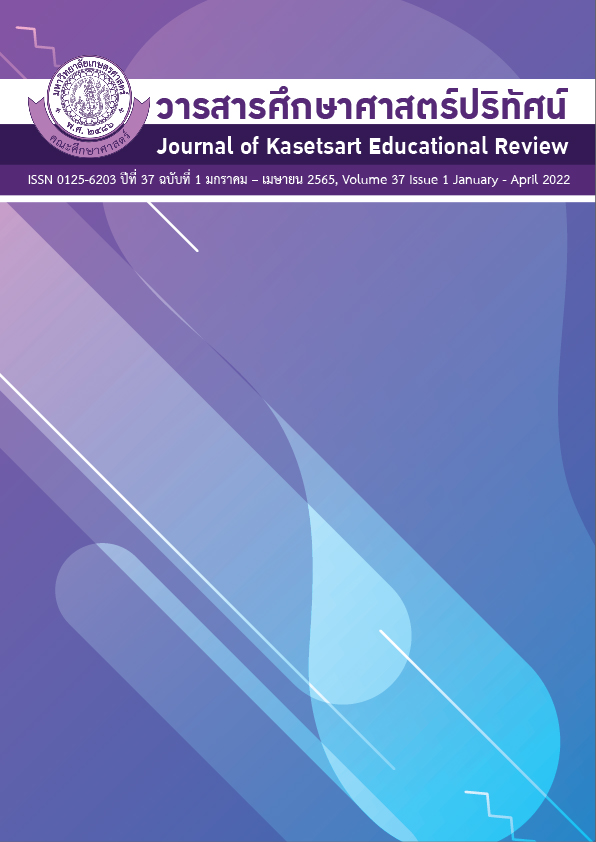ผลของการจัดการเรียนรู้แบบสืบเสาะหาความรู้ 7 ขั้น (7E) ผนวกการใช้ชุดฝึกในวิชาเคมี เรื่อง สารละลาย ที่มีต่อผลสัมฤทธิ์ทางการเรียนวิชาเคมี และความสามารถในการคิดวิเคราะห์ของนักเรียนชั้นมัธยมศึกษาปีที่ 5
คำสำคัญ:
การจัดการเรียนรู้แบบสืบเสาะหาความรู้ 7 ขั้น, ผลสัมฤทธิ์ทางการเรียน, ความสามารถในการคิดวิเคราะห์บทคัดย่อ
การวิจัยครั้งนี้มีวัตถุประสงค์เพื่อ 1) เปรียบเทียบผลสัมฤทธิ์ทางการเรียนของนักเรียนชั้นมัธยมศึกษาปีที่ 5 ที่เรียนด้วยการจัดการเรียนรู้แบบสืบเสาะหาความรู้ 7 ขั้น (7E) ผนวกการใช้ชุดฝึกในวิชาเคมี เรื่อง สารละลาย หลังเรียนกับเกณฑ์ร้อยละ 75 และ 2) เปรียบเทียบความสามารถในการคิดวิเคราะห์ของนักเรียนชั้นมัธยมศึกษาปีที่ 5 ที่เรียนด้วยการจัดการเรียนรู้แบบสืบเสาะหาความรู้ 7 ขั้น (7E) ผนวกการใช้ชุดฝึกในวิชาเคมี เรื่อง สารละลาย ระหว่างก่อนเรียน และหลังเรียน กลุ่มตัวอย่างที่ใช้ในการวิจัย ได้แก่ นักเรียนระดับมัธยมศึกษาปีที่ 5 ภาคเรียนที่ 1 ปีการศึกษา 2563 จำนวน 33 คน ได้มาโดยการสุ่มแบบกลุ่ม เครื่องมือที่ใช้วิจัยครั้งนี้ ได้แก่ 1) แผนการจัดการเรียนรู้แบบสืบเสาะหาความรู้ 7 ขั้น (7E) 2) แบบทดสอบวัดผลสัมฤทธิ์ทางการเรียนวิชาเคมี จำนวน 40 ข้อ มีค่าความยาก อยู่ระหว่าง 0.22-0.78 มีค่าอำนาจจำแนก อยู่ระหว่าง 0.22-0.89 และมีค่าความเที่ยงของแบบทดสอบทั้งฉบับเท่ากับ 0.842 และ 3) แบบทดสอบวัดความสามารถในการคิดวิเคราะห์ จำนวน 20 ข้อ มีอำนาจจำแนก อยู่ระหว่าง 0.22-0.78 และมีค่าความเที่ยงของแบบทดสอบทั้งฉบับเท่ากับ 0.783 ผลการวิจัยสรุปได้ดังนี้ 1) ผลสัมฤทธิ์ทางการเรียนของนักเรียนชั้นมัธยมศึกษาปีที่ 5 ที่เรียนด้วยการจัดการเรียนรู้แบบสืบเสาะหาความรู้ 7 ขั้น (7E) ผนวกการใช้ชุดฝึกในวิชาเคมี เรื่อง สารละลาย หลังเรียนสูงกว่าเกณฑ์ร้อยละ 75 อย่างมีนัยสำคัญทางสถิติที่ระดับ .05 และ 2) ความสามารถในการคิดวิเคราะห์ของนักเรียน หลังเรียนสูงกว่าก่อนเรียนอย่างมีนัยสำคัญทางสถิติที่ระดับ .05
เอกสารอ้างอิง
Bloom, B.S. (Ed.). Engelhart, M.D., Furst, E.J., Hill, W.H., Krathwohl, D.R. (1956). Taxonomy of Educational Objectives, Handbook I: The Cognitive Domain. New York: David McKay Co Inc.
Bybee, R., & et al. (2006). The BSCS 5E Instructional Model: Origins and Effectiveness. Colorado Springs, CO: BSCS.
Chaowakeratipong, N. (2014). Meaning and scope of critical thinking in think, analyze, teach and create. Bangkok: Printing Press of Chulalongkorn University. [in Thai]
Chaowakeratipong, N. (2018). Collection of media subjects Innovation and measurement and evaluation of science learning. (2nd edition). Nonthaburi: Educational Studies Sukhothai Thammathirat Open University. [in Thai]
Department of Academic. (2009). Indicators and subjects of learning the core Science Education Group According to the core curriculum of basic education, B.E. 2551. Bangkok: Printing House The Agricultural Cooperative Federation of Thailand, Ltd. [in Thai]
Duongta, D. (2013). Development of exercises for solving calculation word problems on the topic of Model in chemistry for Mattayom Suksa IV tudents of Nongbua Phitthayakhok School in Nan Province. (Master of Education Thesis). Sukhothai Thammathirat Open University, Nonthaburi. [in Thai]
Eisenkraft, & et al. (2003). Expanding the 5E model: A Proposed 7E emphasizes Transferring of learning and the Importance of Eliciting Prior Understanding. The Science Teacher 70, 60: 56-59.
Inon. N. (2006). Developing a set of training for basic scientific process skills For grade 4). University Ubon Ratchathani Rajabhat, Ubon Ratchathani. (Master of Education Thesis. [in Thai]
Khemmani, T. (2012). Pedagogy: Knowledge for effective learning process. (6th edition). Bangkok: Printing Press of Chulalongkorn University. [in Thai]
Lintattanasirikul, K. (2016). Unit 9. Research and quality inspection tools. In the collection of subjects, research courses, courses and teaching, units 8-11. (6th edition, 1-83).Nonthaburi:Educational Studies Sukhothai Thammathirat Open University. [in Thai]
National Institute of Educational Testing. (2019). Summary of the educational test results at the basic level, Secondary School Level 6, Academic Year 2019. Retrieved 16 March 2020. www.niets.or.th. [in Thai]
Nueangchalerm, P. (2007). Curriculum and Science Teaching. Mahasarakham: Department of Curriculum and Instruction Faculty of Education Mahasarakham University. [in Thai]
Office of the Basic Education Commission Ministry of Education. (2017). Learning standards and indicators Mathematics, Science, and Geography Learning Subjects in Social Studies, Religion and Culture Subjects Group (2017 revised edition) according to the Core Curriculum of Basic Education 2008. Bangkok: Agricultural Cooperative Society of Thailand Co., Ltd. printing house. [in Thai]
Office of the Education Council Secretariat. (2015). Study Report: Status of Teacher Production and Development in Thailand. Bangkok: Prigwhan Graphic Co., Ltd. [in Thai]
Phenglengdi, B. (2018). Teaching and Learn Chemistry by Applying Three Levels of Thinking. Kasetsart Educational Review, 33(2), 145-157. [in Thai]
Prachakoon, V., & Nueangchalerm, P. (2016). Teaching model. (3rd edition). Khonkaen : Klungnana Vitthaya Press. [in Thai]
Sitadee. J. (2016). The effect of quest learning activities together with cooperative learning using STAD technique of Chemistry on solids, liquids, and gases on academic achievement and analytical thinking abilities of Mathayomsuksa 5 students in secondary schools of size extra large Udon Thani Province. (Master of Education Thesis). Sukhothai Thammathirat Open University, Nonthaburi. [in Thai]
Sintuwong, K., & Wissawateeranon, S. (2017). Unit 6. Psychological Fundamentals of the Teaching of Science. Composition of the subject matter, methodology, and nature of science, units 6-10. (5th edition, 1-142). Nonthaburi: Educational Studies Sukhothai Thammathirat Open University. [in Thai]
Sinuankaew.P (2017). Comparison of academic achievement and analytical thinking ability of Mathayomsuksa 5 students on chemical reaction rate obtained 4MAT learning management and normal learning management. (Thesis, Master of Education). Lampang Rajabhat University, Lampang. [in Thai]
ดาวน์โหลด
เผยแพร่แล้ว
ฉบับ
ประเภทบทความ
สัญญาอนุญาต
ลิขสิทธิ์ (c) 2022 วารสารศึกษาศาสตร์ปริทัศน์

อนุญาตภายใต้เงื่อนไข Creative Commons Attribution-NonCommercial-NoDerivatives 4.0 International License.
บทความทุกบทความเป็นลิขสิทธิ์ของวารสารคณะศึกษาศาสตร์ มหาวิทยาลัยเกษตรศาสตร์ วิทยาเขตบางเขน
วารสารศึกษาศาสตร์ปริทัศน์ (Kasetsart Educational Review)






